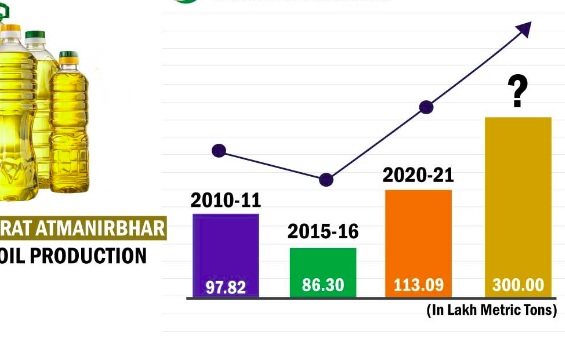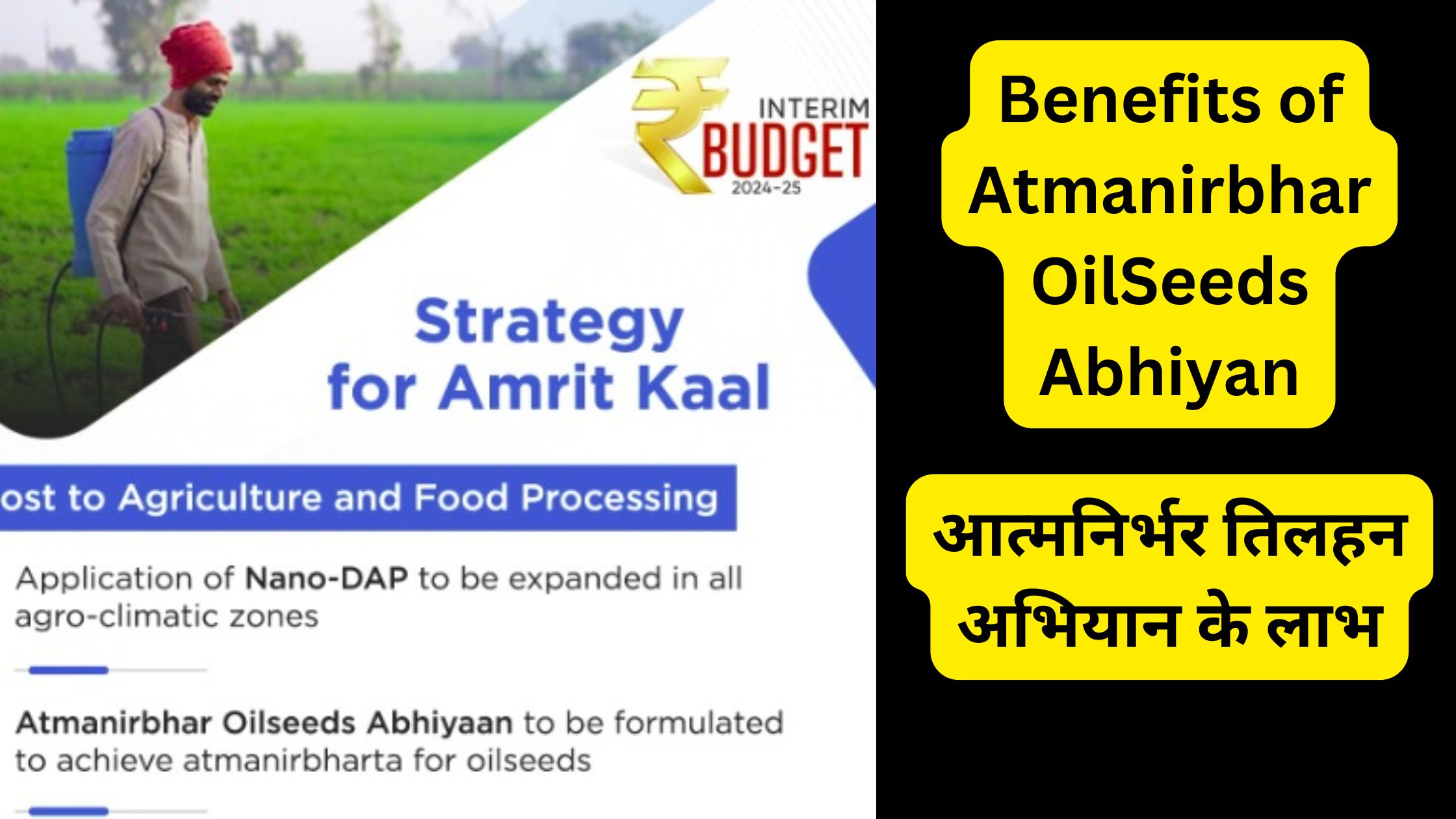India, one of the world’s largest consumers of edible oils, has long been dependent on imports to meet its growing demand. The rising dependence on imports has not only put pressure on the economy but also raised concerns over food security and inflation. To address this issue, the Indian government launched the Atmanirbhar Oil Seeds Abhiyan (Self-Reliant Oil Seeds Campaign), a strategic initiative aimed at boosting domestic oilseed production and reducing import dependency. This article delves into the objectives, strategies, and expected impact of this initiative.
The Need for Atmanirbhar Oil Seeds Abhiyan
India’s edible oil consumption has consistently outpaced its domestic production. The country imports nearly 60-70% of its edible oil requirements, making it vulnerable to global price fluctuations. The primary oilseeds cultivated in India include soybean, groundnut, mustard, sunflower, and sesame. However, production has been insufficient to meet the ever-increasing demand, leading to a significant trade deficit and loss of valuable foreign exchange.

Objectives of the Atmanirbhar Oil Seeds Abhiyan
The Atmanirbhar Oil Seeds Abhiyan was launched with several key objectives:
-
Enhancing Domestic Production: The primary goal is to increase the production of oilseeds in India through various measures such as improved seed quality, better irrigation facilities, and advanced farming techniques.
-
Reducing Import Dependency: By boosting domestic production, the initiative aims to reduce the country’s reliance on imported edible oils, thereby saving foreign exchange and stabilizing the economy.
-
Supporting Farmers: The initiative seeks to provide direct benefits to farmers by ensuring better prices for their produce, reducing input costs, and offering incentives for adopting modern agricultural practices.
-
Promoting Sustainable Agriculture: The campaign encourages sustainable farming practices that not only increase productivity but also protect the environment.
Key Strategies Under the Atmanirbhar Oil Seeds Abhiyan
To achieve its objectives, the Atmanirbhar Oil Seeds Abhiyan implements several strategic measures:
1. Improved Seed Varieties
One of the cornerstone strategies of the campaign is the development and distribution of high-yielding and pest-resistant seed varieties. The government has collaborated with agricultural research institutions to develop seeds that are tailored to different agro-climatic zones in India.
2. Increased MSP and Procurement
To ensure that farmers get remunerative prices for their produce, the government has increased the Minimum Support Price (MSP) for oilseeds. Additionally, procurement operations have been streamlined to ensure that farmers can easily sell their produce at MSP, minimizing the role of middlemen.
3. Infrastructure Development
The initiative includes significant investments in agricultural infrastructure such as cold storage facilities, warehouses, and processing units. This infrastructure development helps in reducing post-harvest losses and improving the overall efficiency of the supply chain.
4. Financial Support and Subsidies
Farmers are provided with financial support in the form of subsidies on inputs like seeds, fertilizers, and pesticides. The government also offers credit facilities at reduced interest rates to help farmers invest in better farming practices.
5. Awareness and Training Programs
To ensure the successful implementation of the campaign, the government has launched various awareness and training programs. These programs educate farmers about the benefits of adopting modern farming techniques, proper usage of inputs, and best practices in crop management.
6. Research and Development
Continuous research and development are vital for the success of the Atmanirbhar Oil Seeds Abhiyan. The government, in collaboration with research institutions, is focusing on developing innovative farming techniques, pest control methods, and soil health management practices.

Expected Impact of the Atmanirbhar Oil Seeds Abhiyan
The Atmanirbhar Oil Seeds Abhiyan is expected to have a profound impact on India’s agricultural landscape and economy:
-
Reduction in Import Bill: By increasing domestic production, the campaign aims to significantly reduce India’s edible oil import bill, thereby conserving foreign exchange reserves.
-
Economic Stability: Reduced dependency on imports will lead to greater economic stability, as the country will be less vulnerable to global price fluctuations and supply chain disruptions.
-
Improved Farmer Incomes: With better prices for their produce and reduced input costs, farmers are expected to see a substantial increase in their incomes, leading to an overall improvement in rural livelihoods.
-
Sustainable Agricultural Practices: The promotion of sustainable farming practices will not only increase productivity but also ensure long-term soil health and environmental conservation.
-
Boost to Agro-Industry: The development of infrastructure and increased production of oilseeds will give a significant boost to the agro-processing industry, creating jobs and contributing to the economy.
Challenges and the Way Forward
While the Atmanirbhar Oil Seeds Abhiyan is a commendable initiative, it is not without challenges. Issues such as climate change, water scarcity, and fluctuating global prices of edible oils could pose significant hurdles. Additionally, the success of the campaign largely depends on the effective implementation of policies at the grassroots level.
To overcome these challenges, it is crucial to continuously monitor the progress of the campaign and make necessary adjustments. Collaborating with private players, enhancing farmer participation, and promoting technological innovations will also play a key role in ensuring the success of the Atmanirbhar Oil Seeds Abhiyan.
Conclusion
The Atmanirbhar Oil Seeds Abhiyan is a bold step towards making India self-reliant in edible oil production. By focusing on enhancing domestic production, supporting farmers, and promoting sustainable practices, the initiative aims to transform India’s oilseed sector. If successfully implemented, it will not only reduce the country’s dependency on imports but also ensure economic stability and improve the livelihoods of millions of farmers. This initiative is a significant move towards realizing the vision of a self-reliant India, contributing to the nation’s overall growth and prosperity.
भारत, जो दुनिया में सबसे अधिक खाद्य तेलों का उपभोक्ता है, अपनी बढ़ती मांग को पूरा करने के लिए लंबे समय से आयात पर निर्भर रहा है। आयात पर बढ़ती निर्भरता ने न केवल अर्थव्यवस्था पर दबाव डाला है, बल्कि खाद्य सुरक्षा और महंगाई को लेकर चिंताएं भी बढ़ा दी हैं। इस समस्या को दूर करने के लिए, भारत सरकार ने आत्मनिर्भर तिलहन अभियान (Self-Reliant तिलहन Campaign) की शुरुआत की है, जिसका उद्देश्य घरेलू तिलहन उत्पादन को बढ़ावा देना और आयात पर निर्भरता को कम करना है। इस लेख में इस पहल के उद्देश्यों, रणनीतियों और अपेक्षित प्रभाव पर चर्चा की गई है।
आत्मनिर्भर तिलहन अभियान की आवश्यकता
भारत में खाद्य तेलों की खपत घरेलू उत्पादन से अधिक रही है। देश अपनी खाद्य तेल आवश्यकताओं का लगभग 60-70% आयात करता है, जिससे वह वैश्विक मूल्य उतार-चढ़ाव के प्रति संवेदनशील हो जाता है। भारत में प्रमुख तिलहन फसलें सोयाबीन, मूंगफली, सरसों, सूरजमुखी और तिल हैं। हालाँकि, उत्पादन की दर बढ़ती मांग को पूरा करने के लिए अपर्याप्त रही है, जिससे व्यापार घाटा और मूल्यवान विदेशी मुद्रा का नुकसान हुआ है।
आत्मनिर्भर तिलहन अभियान के उद्देश्य
आत्मनिर्भर तिलहन अभियान को कई प्रमुख उद्देश्यों के साथ शुरू किया गया है:
- घरेलू उत्पादन को बढ़ाना: इस अभियान का मुख्य उद्देश्य तिलहन उत्पादन को बढ़ाना है, जिसमें बेहतर बीज गुणवत्ता, उन्नत सिंचाई सुविधाएं और आधुनिक कृषि तकनीकों का उपयोग शामिल है।
- आयात निर्भरता को कम करना: घरेलू उत्पादन को बढ़ावा देकर, यह पहल देश की आयातित खाद्य तेलों पर निर्भरता को कम करने, विदेशी मुद्रा की बचत और अर्थव्यवस्था को स्थिर करने का लक्ष्य रखती है।
- किसानों का समर्थन: इस पहल का उद्देश्य किसानों को उनके उत्पाद के लिए बेहतर कीमत सुनिश्चित करके, उत्पादन लागत को कम करके और आधुनिक कृषि पद्धतियों को अपनाने के लिए प्रोत्साहन देकर सीधे लाभ पहुंचाना है।
- सतत कृषि को बढ़ावा देना: यह अभियान ऐसी स्थायी कृषि पद्धतियों को प्रोत्साहित करता है जो न केवल उत्पादकता बढ़ाती हैं बल्कि पर्यावरण की भी रक्षा करती हैं।
आत्मनिर्भर तिलहन अभियान के तहत प्रमुख रणनीतियाँ
अपने उद्देश्यों को प्राप्त करने के लिए, आत्मनिर्भर तिलहन अभियान कई रणनीतिक उपायों को लागू करता है:
- बेहतर बीज किस्में
अभियान की एक प्रमुख रणनीति उच्च उत्पादन और कीट प्रतिरोधी बीज किस्मों का विकास और वितरण है। सरकार ने विभिन्न कृषि जलवायु क्षेत्रों के लिए उपयुक्त बीज विकसित करने के लिए कृषि अनुसंधान संस्थानों के साथ सहयोग किया है।
- एमएसपी और खरीद में वृद्धि
यह सुनिश्चित करने के लिए कि किसानों को उनके उत्पाद के लिए लाभकारी कीमतें मिलें, सरकार ने तिलहन के लिए न्यूनतम समर्थन मूल्य (एमएसपी) बढ़ा दिया है। इसके अलावा, किसानों को एमएसपी पर अपना उत्पाद बेचने में आसानी हो, इसके लिए खरीद संचालन को सुव्यवस्थित किया गया है, जिससे बिचौलियों की भूमिका कम हो सके।
- इन्फ्रास्ट्रक्चर का विकास
इस पहल में कोल्ड स्टोरेज सुविधाओं, गोदामों और प्रसंस्करण इकाइयों जैसी कृषि अवसंरचना में महत्वपूर्ण निवेश शामिल हैं। यह अवसंरचना विकास पोस्ट-हार्वेस्ट नुकसान को कम करने और आपूर्ति श्रृंखला की समग्र दक्षता में सुधार करने में मदद करता है।
- वित्तीय सहायता और सब्सिडी
किसानों को बीज, उर्वरक और कीटनाशक जैसे इनपुट पर सब्सिडी के रूप में वित्तीय सहायता प्रदान की जाती है। सरकार किसानों को बेहतर कृषि पद्धतियों में निवेश करने में मदद करने के लिए रियायती ब्याज दरों पर ऋण सुविधाएं भी प्रदान करती है।
- जागरूकता और प्रशिक्षण कार्यक्रम
अभियान के सफल कार्यान्वयन के लिए, सरकार ने विभिन्न जागरूकता और प्रशिक्षण कार्यक्रम शुरू किए हैं। ये कार्यक्रम किसानों को आधुनिक कृषि तकनीकों को अपनाने के लाभों, इनपुट के उचित उपयोग और फसल प्रबंधन में सर्वोत्तम प्रथाओं के बारे में शिक्षित करते हैं।
- अनुसंधान और विकास
आत्मनिर्भर तिलहन अभियान की सफलता के लिए निरंतर अनुसंधान और विकास महत्वपूर्ण है। सरकार, अनुसंधान संस्थानों के साथ मिलकर, नवाचारी कृषि तकनीकों, कीट नियंत्रण विधियों और मृदा स्वास्थ्य प्रबंधन प्रथाओं के विकास पर ध्यान केंद्रित कर रही है।
आत्मनिर्भर तिलहन अभियान का अपेक्षित प्रभाव
आत्मनिर्भर तिलहन अभियान का भारत के कृषि परिदृश्य और अर्थव्यवस्था पर गहरा प्रभाव पड़ने की उम्मीद है:
- आयात बिल में कमी: घरेलू उत्पादन बढ़ाकर, अभियान का उद्देश्य भारत के खाद्य तेल आयात बिल को काफी हद तक कम करना है, जिससे विदेशी मुद्रा भंडार की बचत हो सके।
- आर्थिक स्थिरता: आयात पर निर्भरता कम होने से अधिक आर्थिक स्थिरता आएगी, क्योंकि देश वैश्विक मूल्य उतार-चढ़ाव और आपूर्ति श्रृंखला व्यवधानों के प्रति कम संवेदनशील होगा।
- किसानों की आय में वृद्धि: अपने उत्पाद के लिए बेहतर कीमत और उत्पादन लागत में कमी के साथ, किसानों की आय में काफी वृद्धि होने की उम्मीद है, जिससे ग्रामीण आजीविका में समग्र सुधार होगा।
- सतत कृषि पद्धतियां: सतत कृषि पद्धतियों को बढ़ावा देने से न केवल उत्पादकता में वृद्धि होगी बल्कि दीर्घकालिक मृदा स्वास्थ्य और पर्यावरण संरक्षण भी सुनिश्चित होगा।
- कृषि उद्योग को बढ़ावा: बुनियादी ढांचे के विकास और तिलहन उत्पादन में वृद्धि से कृषि प्रसंस्करण उद्योग को महत्वपूर्ण बढ़ावा मिलेगा, जिससे रोजगार सृजन और अर्थव्यवस्था में योगदान होगा।
चुनौतियाँ और आगे का रास्ता
हालांकि आत्मनिर्भर तिलहन अभियान एक सराहनीय पहल है, लेकिन यह चुनौतियों से मुक्त नहीं है। जलवायु परिवर्तन, जल की कमी और खाद्य तेलों के वैश्विक मूल्य में उतार-चढ़ाव जैसी समस्याएं महत्वपूर्ण बाधाएं उत्पन्न कर सकती हैं। इसके अलावा, अभियान की सफलता काफी हद तक जमीनी स्तर पर नीतियों के प्रभावी कार्यान्वयन पर निर्भर करती है।
निष्कर्ष
आत्मनिर्भर तिलहन अभियान खाद्य तेल उत्पादन में भारत को आत्मनिर्भर बनाने की दिशा में एक साहसिक कदम है। घरेलू उत्पादन बढ़ाने, किसानों का समर्थन करने और सतत पद्धतियों को बढ़ावा देने पर ध्यान केंद्रित करके, इस पहल का उद्देश्य भारत के तिलहन क्षेत्र को बदलना है। यदि सफलतापूर्वक कार्यान्वित किया जाता है, तो यह पहल न केवल देश की आयात पर निर्भरता को कम करेगी बल्कि आर्थिक स्थिरता सुनिश्चित करेगी और लाखों किसानों की आजीविका में सुधार करेगी। यह पहल आत्मनिर्भर भारत की दृष्टि को साकार करने की दिशा में एक महत्वपूर्ण कदम है, जो राष्ट्र की समग्र वृद्धि और समृद्धि में योगदान करेगी।


